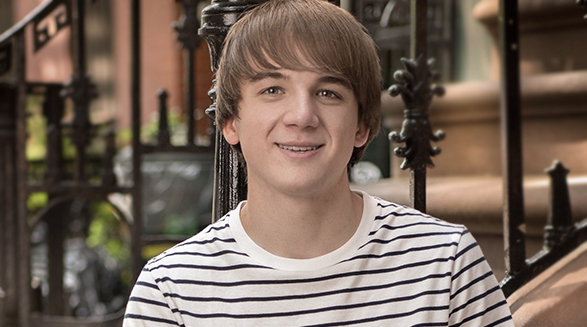We interviewed 20 year old inventor, scientist and cancer researcher Jack Andraka about his experiences with bullying and coming out
Jack Andraka’s journey began at age fifteen when, after losing a close family friend to pancreatic cancer, he invented an inexpensive early detection method for pancreatic, ovarian, and lung cancer. Now studying electrical engineering and public policy at Stanford, Andraka conducts research on nanorobots, inexpensive biosensors, disease diagnostics, water filters, and econometrics while serving as faculty at the Stanford Anesthesiology Summer Institute. During school he experienced severe bullying. Here he tells us about his experiences.
DtL: Hi Jack! Can you tell us a little bit about yourself?
Jack: I’m currently 19 years old and I’m in my sophomore year of college at Stanford studying electrical engineering and public policy. My research mostly focuses on combining bioengineering with nanomaterials to create exciting new technologies such as nanorobots and inexpensive biosensors for infectious diseases, cancer, and water contaminants. My kind of weird hobby is analysing international data sets to help create better policies for public health, international security, and the environment. In my free time I do whitewater kayaking and I represented the US at the U-23 world championships for wildwater kayaking and placed in the top 20. Aside from that I love rock climbing, biking, swimming, sometimes running, hanging out with friends, and binge watching Netflix ☺
“I experienced pretty severe bullying when I was in 7th and 8th grade especially when I came out as gay”
DtL: Have you ever experienced bullying?
Jack: I experienced pretty severe bullying when I was in 7th and 8th grade especially when I came out as gay. Many of my teachers that previously supported me, humiliated me in front of the class, I was ostracized by my classmates, and I had to eat my lunch alone in the bathroom. Because of this I struggled with depression and attempted suicide. However, what really helped me overcome this was throwing myself into my research and working on improving myself while trying to ignore the people that bullied me and sticking with the few friends I had. It definitely was difficult but eventually I got through it and I’m so glad.
DtL: What advice would you give to those that are being bullied?
Jack: Different strategies work for different people; however, what worked for me was focusing on the positives in my life and to work on improving myself by committing myself to my research as well as sticking with the few friends I had. Also realizing that things would get better (middle and high school sucks for a lot of people) definitely helped. So I would advise finding something you’re passionate about and working hard on that as well as hanging out with those that love and care about you (such as friends and family).
“To be honest I was a bit of a wimp when I came out. I was too nervous to tell anyone face to face”
DtL: Do you have a coming out story? If so can you share it with us?
Jack: To be honest I was a bit of a wimp when I came out. I was too nervous to tell anyone face to face so I first told my camp counsellor at math camp and then following several awkward discussions with him and a million practice runs in my head I texted my best friend that I was gay and promptly threw my phone across the room and refused to look at it for the rest of the night. I then asked her the next day to tell everyone for me and the news spread pretty quickly (it was a small, conservative school so I was the only out gay person and me coming out was scandalous news). Then some people told their parents who asked my parents about it, and to put it lightly it was an awkward conversation when I got home. But fortunately my parents were supportive (although I’m still shunned by some of my extended family) and after a rough patch in 8th grade I got into high school and things were a-okay from there!
DtL: At such a young age you have done something truly amazing and invented a test to detect pancreatic cancer. What motivated you to explore that area specifically?
Jack: I got really interested in pancreatic cancer after a close family friend, who was like an uncle to me, passed away from pancreatic cancer. After doing some research I found that there really was no way to detect these cancers until it was far too late, when patients had less than a 2% chance of survival. So I set out armed with 8th grade biology to change how we detected pancreatic cancer.
DtL: If you could go back in time, what one thing would you tell your younger self?
Jack: I would tell myself to always focus more on the positives in your life rather than the negatives and that you aren’t as alone as you think. Also I would probably tell myself that it does get better and that everything works out in the end.
DtL: You have said you would like to ‘help inspire other LGBT+ youth to get involved in STEM’ – do you think the LGBT+ community is underrepresented in those arenas, if so why do you think that is?
Jack: Although studies are difficult to find, those that do exist suggest that the number of LGBT individuals in STEM fields is 20% lower than expected. In this year’s OUT 100, purportedly a list of the 100 most compelling LGBT individuals, there wasn’t a single scientist or engineer. So I think it is both an issue of underrepresentation of LGBT individuals in STEM as well as an issue of underrepresentation of individuals in STEM in LGBT media. Both the LGBT and STEM community have to work hard to reduce this underrepresentation.
“I set out armed with 8th grade biology to change how we detected pancreatic cancer”
DtL: What does the future hold for Jack?
Jack: Long term? I have no clue. In the short term I’ve been continuing my work on inexpensive disease diagnostics and water biosensors that can be used for crowdsourcing epidemiology and environmental monitoring in resource-limited settings. I’m also working on creating nanorobots to detect and treat cancers as well as perform targeted gene delivery for interesting applications in the treatment of genetic diseases and understanding basic biology.
DtL: What advice would you give to those who may be struggling to come to terms with their sexuality?
Jack: My biggest advice would be to take it at your own pace and do what feels comfortable. Coming to terms with your sexuality and coming out to your people is a confusing and scary time, I’m not going to lie. So just take it slow, do what feels right, and it will work out in the end ☺
DtL: What motto do you live by?
Jack: “Do it, you won’t!” I’m not sure it’s a motto, but it is my favourite thing to say. It captures my reckless/impulsive streak but I also think it helps me go outside my comfort zone and try new experiences. Although it is a motto that should be taken with a grain of salt.
DtL: Is there anything you would like to add?
Jack: Just be yourself and go out there and change the world!













